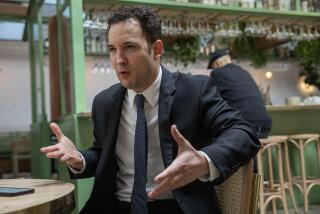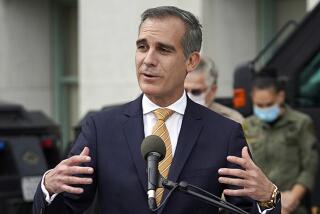Weld Battle Gives Lugar a Turn at Hardball
- Share via
WASHINGTON — When Richard G. Lugar won the mayoralty of Indianapolis in 1967, newspaper cartoonists depicted him in his old Boy Scout uniform, complete with short pants, confronting a menacing gang of political bosses.
But despite the perception that he was too genteel for hardball politics, Lugar tamed the bosses during his two terms in City Hall and went on to become one of the U.S. Senate’s most influential policymakers. Yet even today, because of Lugar’s understated manner, “people don’t realize how calculating and determined he is,” said one longtime associate.
Now the 65-year-old must summon all his cunning and resolve as he faces one of the severest tests of his long political career: his challenge to fellow Republican Sen. Jesse Helms over the nomination of William F. Weld as U.S. ambassador to Mexico.
It’s a confrontation with potentially far-reaching implications for the conduct of U.S. foreign policy. “What’s at stake is the way we do business in the Foreign Relations Committee,” Lugar said.
Lugar’s mission is to persuade Helms, the North Carolinian who chairs the committee, to change his mind about bottling up Weld’s nomination. In Lugar’s view, no individual lawmaker should be able to thwart an appointment simply by refusing to hold a confirmation hearing.
“The advice and consent of the Senate means just that--it ought not to mean just a single senator who terminates the process prematurely,” he said.
In part, Washington insiders say Lugar’s decision to take on the battle reflects his set of personal values. “Lugar has a sense of Midwestern propriety about how these things ought to be handled, which has been offended by Helms using his power as chairman to sit on the nomination,” said David Mason, head of congressional studies at the Heritage Foundation.
And it’s no secret on Capitol Hill that Lugar and Helms have long been on the outs--at least since Helms used his seniority following the 1986 elections to shoulder Lugar aside as ranking minority member on the committee and take that post for himself.
The two men are a study in contrasts, both in style and substance. Lugar is a courtly proponent of bipartisanship. Helms is a cantankerous champion of conservative ideology.
But adding to these tensions, according to those in a position to know, is a broader factor: Lugar’s discontent with how the U.S. role in the world is being molded by President Clinton and by Helms, who have become unlikely political bedfellows as each seeks to attain his objectives by compromising with the other.
*
“The Weld issue is just the tip of the iceberg for Lugar,” said Mark Helmke, a former Senate aide and currently an informal advisor to Weld. “He thinks Clinton’s approach to foreign policy is too ad hoc, too reactive and too headline-oriented. And he thinks Helms’ approach is that if it’s something he doesn’t like, he won’t let it happen.”
Lugar made a point last spring of criticizing the administration for being “totally ineffective” in its congressional lobbying on behalf of foreign policy goals. And more recently he chided the White House for inaction on the Weld nomination. “I’m not aware the administration is doing anything on behalf of Bill Weld,” he complained.
The Lugar-Helms friction was intensified when Helms picked three other Republican senators junior to Lugar to serve on the House-Senate conference committee that will consider major legislation on State Department reorganization. Lugar complained, calling the decision “absurd,” but to no avail.
All this has been particularly hard to accept for Lugar, a man who takes foreign policy, and his own role in it, seriously. Indeed, he based his 1996 presidential campaign around an effort to convince Americans that despite the Cold War’s end, foreign policy remains a priority.
“He is someone who long garnered the applause of the foreign policy community,” said Thomas Mann, director of governmental studies at the Brookings Institution. “He has been a major player on Russia after the Cold War, on bringing democracy to the Philippines and on NATO expansion.”
*
Nor is this the first time that concern with foreign policy has led Lugar into a clash with the leadership of his party. In 1986, over the opposition and the veto of President Reagan, Lugar led the successful fight to impose economic sanctions on South Africa in protest of apartheid.
In his determination to overcome Helms’ opposition to hearings for Weld, Lugar has even resorted to what he conceded was an uncharacteristic tactic. He has issued an implied threat that he might use his authority as Agriculture Committee chairman to deal with tobacco issues vital to Helms’ home state in the same arbitrary way Helms is wielding his power on the Weld nomination.
Nevertheless, many believe the odds are against Lugar, in part because his chances for success depend on convincing other senators to defy Helms’ authority.
“Remember,” Mann said, “Helms’ power exists only because other senators have done their own cost-benefit analyses and decided that the costs of challenging him outweigh the benefits.”
Lugar’s answer boils down to trying to embarrass the Senate into doing what he believes is right.
“Obviously, it’s always difficult for senators to consider other procedures. But I don’t know how you defend this one. And I believe that a majority of Americans would agree with me.”
More to Read
Get the L.A. Times Politics newsletter
Deeply reported insights into legislation, politics and policy from Sacramento, Washington and beyond. In your inbox twice per week.
You may occasionally receive promotional content from the Los Angeles Times.










